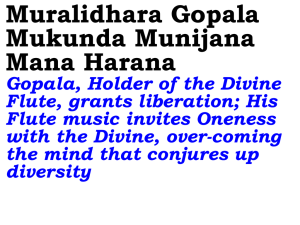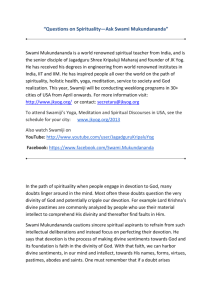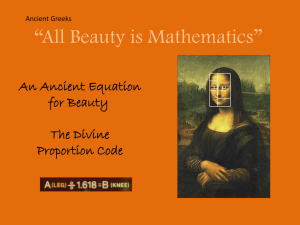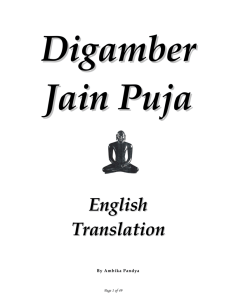Bhakti - JKYog
advertisement
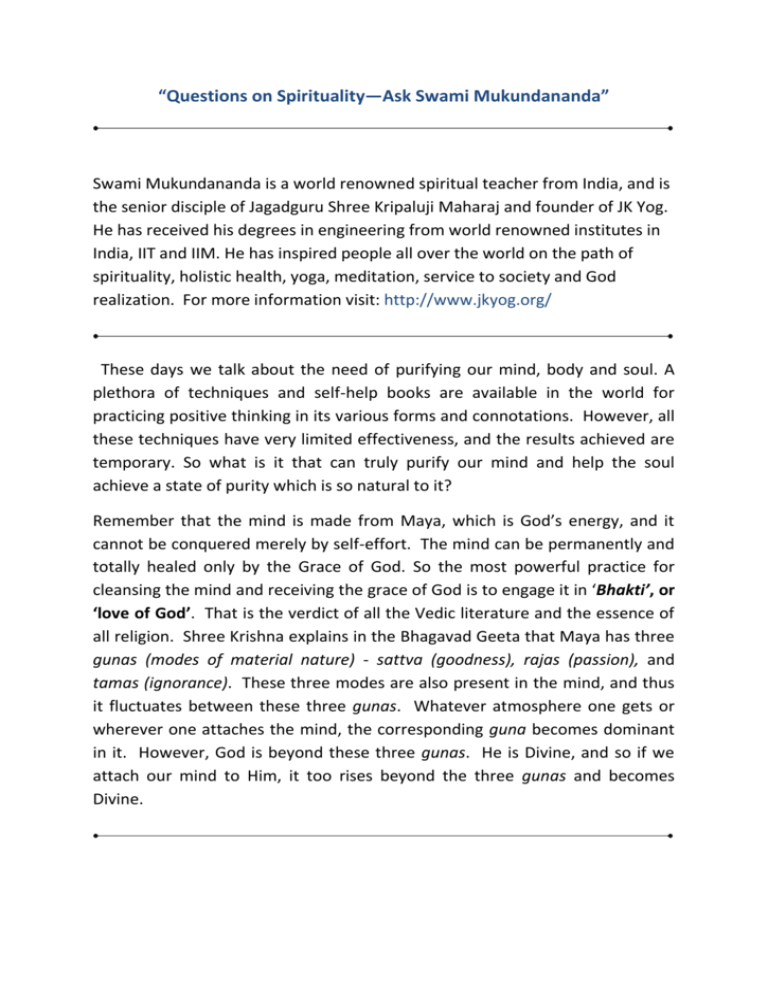
“Questions on Spirituality—Ask Swami Mukundananda” Swami Mukundananda is a world renowned spiritual teacher from India, and is the senior disciple of Jagadguru Shree Kripaluji Maharaj and founder of JK Yog. He has received his degrees in engineering from world renowned institutes in India, IIT and IIM. He has inspired people all over the world on the path of spirituality, holistic health, yoga, meditation, service to society and God realization. For more information visit: http://www.jkyog.org/ These days we talk about the need of purifying our mind, body and soul. A plethora of techniques and self-help books are available in the world for practicing positive thinking in its various forms and connotations. However, all these techniques have very limited effectiveness, and the results achieved are temporary. So what is it that can truly purify our mind and help the soul achieve a state of purity which is so natural to it? Remember that the mind is made from Maya, which is God’s energy, and it cannot be conquered merely by self-effort. The mind can be permanently and totally healed only by the Grace of God. So the most powerful practice for cleansing the mind and receiving the grace of God is to engage it in ‘Bhakti’, or ‘love of God’. That is the verdict of all the Vedic literature and the essence of all religion. Shree Krishna explains in the Bhagavad Geeta that Maya has three gunas (modes of material nature) - sattva (goodness), rajas (passion), and tamas (ignorance). These three modes are also present in the mind, and thus it fluctuates between these three gunas. Whatever atmosphere one gets or wherever one attaches the mind, the corresponding guna becomes dominant in it. However, God is beyond these three gunas. He is Divine, and so if we attach our mind to Him, it too rises beyond the three gunas and becomes Divine. Question: In today's materialistic world, the soul takes a beating, and the extent depends on the society, the profession, the community and each person's ability to bear it. How does one cleanse or heal his soul? Swami Mukundananda: Here it is important for a person to understand that you are the soul, which is a part of God, and hence by nature you are perpetually Divine. You do not need to cleanse the soul. The problem is that the soul is identifying with the body, mind, and intellect. Hence, when the mind feels tormented, the soul experiences the misery. So when you say that the soul takes a beating, what you mean is that the mind takes a beating, and the soul experiences the pain vicariously. Once the mind is sufficiently cleansed, the soul will be able to perceive the distinction between itself and the mind, and dis-identify itself from its dualities. Hence, we must endeavour to cleanse the mind. And as mentioned already the most powerful practice for cleansing the mind is to engage it in Bhakti, or love of God. The Bhagavatam states: Dharma satya dayo… “We may follow all the rules of proper conduct, we may perform severe austerities, and we may accumulate the most esoteric knowledge, but without Bhakti, none of these practices will suffice in cleansing the mind.” Question: What is Divine Love and how is it different from worldly love? SM: Divine love is that where the desire is simply to give…give…and give. There is no selfish desire for anything in return. Worldly love is that where the desire is to take…take… and take. It is a selfish affection for one’s own happiness. Chaitanya Mahaprabhu compared the two to sunlight and darkness: Kamer tatparya nij… “Worldly love (lust) is for the sake of self-pleasure while Divine Love is for the sake of Shree Krishna’s pleasure. Reject all kinds of religiosity to practice devotion to Shree Krishna. Relish this Divine Love for the sake of Shree Krishna’s happiness. There is a great difference between Divine Love and lust; the former is like the rays of sunlight, while the latter is like darkness.” Question: If in unconditional love we should not ask God for anything, then why should we also ask Him for His grace? SM: The scriptures ask us to engage in devotion for the pleasure of God and to make His service as our goal. However, we can only serve God if we possess love for Him. God is not interested in our mechanical actions; He is pleased by the love of our heart. So with the goal of serving God and making Him happy, we can ask for Grace, Divine knowledge, Divine Love, renunciation from the world, etc. Since our objective is the satisfaction of God and Guru, our asking will not be considered selfish. Question: How can the gopi's love for Krishna be interpreted in the path of devotion? SM: We should not make figurative interpretations of the Divine pastimes of God; rather we should take them as literal and true. The word for devotion in Sanskrit is “Upasana”, which means to go and sit close to God. But how will we go close to Him? There are five bhavs (sentiments) of devotion that help us develop proximity with Him: 1. Shant bhav or the sentiment of Majesty: “Shree Krishna is my King.” 2. Dasya bhav or the sentiment of Servitude: “Shree Krishna is my Master.” 3. Sakhya bhav or the Fraternal sentiment: “Shree Krishna is my Friend.” 4. Vatsalya bhav or the Maternal sentiment: “Shree Krishna is my Mother.” 5. Madhurya bhav or the Conjugal sentiment: “Shree Krishna is my Beloved.” These sentiments get us sequentially closer to God. The gopis loved Shree Krishna as their Beloved, and this is considered the highest sentiment of devotion. It is distinguished from the sentiment of worldly lovers by the trait of selflessness. The great Acharya of Bhakti, Narad Muni states: Yatha braj gopika bhav (Narad Bhakti Darshan) “The highest ideal of devotion was manifest in the gopis.” Hence, the scriptures and the great Saints have alike praised the devotion of the gopis and we should not misinterpret it to be some kind of material love. Question: Is Bhakti something that is bestowed upon the soul by God’s Grace, or is it something that is developed in the heart by purusharth (selfeffort)? SM: Prema Shakti (Divine Love) is the essence of the essence of the essence of the highest power of God (Divine Internal Energy called Yogmaya). It is such a power that God Himself becomes a servant of whoever possesses it. This highest power of God cannot be attained by purusharth (self-effort). It is only attained by the Grace of the God-realized Saints who already possess it. Lord Ram told Lakshman: Bhakti taat anupam… (Ramayan) “Bhakti is the source of incomparable Divine Bliss. It is obtained when the Guru bestows His Grace upon the soul.” We need to keep in mind that the Grace of God and the Guru is not a whimsical occurrence. Grace is bestowed when we prepare the vessel of the heart to receive it. The heart is cleansed by doing Sadhan Bhakti (Preparatory Devotion). Thus, we need to do Sadhan Bhakti and then by the Grace of the Guru, we will get Siddha Bhakti (Divine Love).

